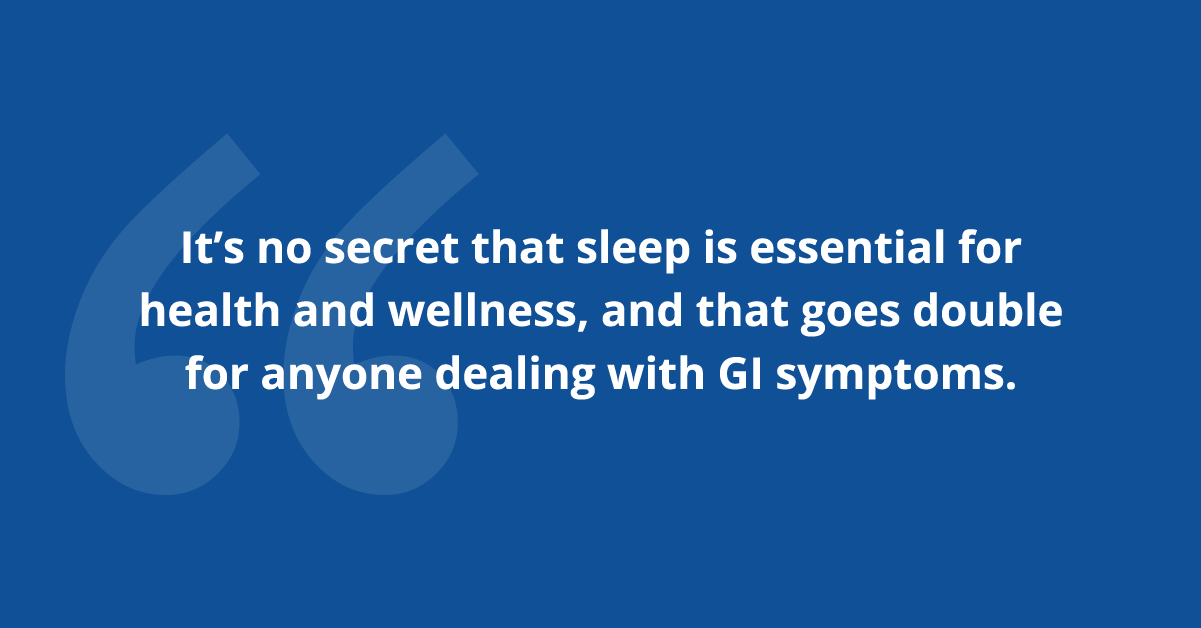In short, stress is one of the biggest aggravators of digestion problems like constipation, heartburn, diarrhea and cramping. When our bodies are constantly in fight-or-flight mode, it takes a toll on regular digestion. Many of our body’s systems go into overdrive: heart rates go up, blood pressure increases, muscles can get tense and spasm… and stomach acid production increases. This can exacerbate symptoms of GERD, and create worsening symptoms further down the intestinal tract.
Because sleep quality is impacted by digestion (and vice versa), we can’t overlook this connection regarding overall health. Digestion is a core system that powers our bodies. We need it to work properly to deliver fuel—nutrients—to keep all the whole engine running.
Also, sleep is connected to the hormones that control hunger. There’s a strong connection between higher body mass index (BMI) and poor sleep–people who get 5 hours or less of sleep per night have an increased risk of developing obesity.
When you don’t sleep enough, you’re more likely to feel hungry and crave some not-so-healthy things. The culprit here is a hormone called ghrelin, which is produced by the stomach and makes you feel hungry. Sleep helps to keep ghrelin in check, so when sleep is disrupted on a regular basis, ghrelin production goes into overdrive.
Ghrelin is the opposite of leptin, which is a hormone released by fat cells that suppresses hunger pangs. If these two hormones are imbalanced all the time due to poor sleep, it can lead to obesity and other health issues.
Whether you’re trying to improve your overall health, reduce GI symptom severity, feel better during the day, or lose weight, adequate sleep is crucial. This is true not just as a general rule, but in clinical applications for specific GI issues as well. For instance, a 2020 Scientific Reports study shows sleep is connected to a patient’s mood state, disability, and quality of life for patients suffering from inflammatory bowel disease (IBD).
Six Tips for Better Sleep
The encouraging news is that we can take a few proactive steps to improve the chances of getting a better night’s sleep. Here are some tips from our GIThrive Care Team for promoting healthy rest, every single night.

1. Stick to a regular sleep-wake cycle, even on the weekends.
Go to bed and wake up within the same 30-minute window every night and every morning, even on Saturdays.
2. Develop a bedtime routine.
Try a warm bath, a cup of decaf tea, or some relaxing music to get you in the mood for sleep. If you set a routine, your body will start to wind down automatically, making it much easier to doze off at bedtime.
3. Try a relaxation technique not only before bed, but also during the day.
Deep breathing, meditation/mindfulness, and aromatherapy can all be effective ways to manage stress and calm the mind and body. When bedtime rolls around, use your go-to relaxation technique to unwind.
4. Lower the thermostat.
Research shows the ideal temperature for quality sleep is between 65 and 69 degrees Fahrenheit.
5. Set a digital curfew.
Put away anything with a screen at least 30 minutes before bedtime. This means your smartphone, TV, tablet, computer—anything with a screen. The blue light emitted from the screen can interfere with falling asleep.
6. Turn off the lights.
When it’s dark, your body produces melatonin, a hormone that makes you feel tired. Dimming the lights an hour before bedtime may boost melatonin production and promote good sleep. If exterior lights are a problem, consider blackout curtains for your bedroom.
Overall, the GIThrive Care Team is specially trained to help members develop healthy habits and create personalized care plans to manage a range of digestive conditions and symptoms. We customize support to the needs of each individual. If someone needs help developing a meal plan, guidance on how to talk to their doctor or advice on creating evening routines to promote healthy sleep, whatever the need might be… we’re here to help!
[/vc_column_text][/vc_column][/vc_row]
Are you tired right now?
If you’re like most adults, feeling tired is almost a fact of life. It seems like we’re always on the go—with work, with families, and loads of daily responsibilities. Many of us stay up later than we’d like just trying to fit it all in. And when your head does finally hit the pillow, do you find yourself thinking a hundred things before your brain finally turns out the mental lights for the night?

If you’re nodding as you read this, you’re not alone. The Center for Disease Control (CDC) says 1 in 3 Americans is sleep deprived. Not getting enough sleep has numerous health and safety risks, and can create a cycle that’s hard to break—you don’t feel your best when you aren’t getting enough sleep; and then, you can’t get enough sleep because you’re not feeling well.
Poor sleep can have negative impacts on overall wellness, including digestive health. What can we do to help ensure we get a proper night’s sleep?
In this post, we take a look at some research into the subject and share six tips for better sleep from Vivante Health’s team of registered dietitians and health coaches.
The Sleep/Gut Connection
It’s no secret that sleep is essential for health and wellness and that goes double for anyone dealing with GI symptoms. A 2019 study linked our sleep cycles to gut bacteria, showing that insufficient sleep and poor eating habits can have a negative impact on our individual intestinal microbiome.
Our bodies crave rhythm and healthy routines to keep our internal clocks (known as our circadian rhythm) running. Interruptions to our internal clock’s preferred schedules create stress that can manifest in problems ranging from poor digestion, higher blood pressure, and lowered immunity, to even hormone issues and increased risk of metabolic disorders.
In short, stress is one of the biggest aggravators of digestion problems like constipation, heartburn, diarrhea and cramping. When our bodies are constantly in fight-or-flight mode, it takes a toll on regular digestion. Many of our body’s systems go into overdrive: heart rates go up, blood pressure increases, muscles can get tense and spasm… and stomach acid production increases. This can exacerbate symptoms of GERD, and create worsening symptoms further down the intestinal tract.
Because sleep quality is impacted by digestion (and vice versa), we can’t overlook this connection regarding overall health. Digestion is a core system that powers our bodies. We need it to work properly to deliver fuel—nutrients—to keep all the whole engine running.
Also, sleep is connected to the hormones that control hunger. There’s a strong connection between higher body mass index (BMI) and poor sleep–people who get 5 hours or less of sleep per night have an increased risk of developing obesity.
When you don’t sleep enough, you’re more likely to feel hungry and crave some not-so-healthy things. The culprit here is a hormone called ghrelin, which is produced by the stomach and makes you feel hungry. Sleep helps to keep ghrelin in check, so when sleep is disrupted on a regular basis, ghrelin production goes into overdrive.
Ghrelin is the opposite of leptin, which is a hormone released by fat cells that suppresses hunger pangs. If these two hormones are imbalanced all the time due to poor sleep, it can lead to obesity and other health issues.
Whether you’re trying to improve your overall health, reduce GI symptom severity, feel better during the day, or lose weight, adequate sleep is crucial. This is true not just as a general rule, but in clinical applications for specific GI issues as well. For instance, a 2020 Scientific Reports study shows sleep is connected to a patient’s mood state, disability, and quality of life for patients suffering from inflammatory bowel disease (IBD).
Six Tips for Better Sleep
The encouraging news is that we can take a few proactive steps to improve the chances of getting a better night’s sleep. Here are some tips from our GIThrive Care Team for promoting healthy rest, every single night.

1. Stick to a regular sleep-wake cycle, even on the weekends.
Go to bed and wake up within the same 30-minute window every night and every morning, even on Saturdays.
2. Develop a bedtime routine.
Try a warm bath, a cup of decaf tea, or some relaxing music to get you in the mood for sleep. If you set a routine, your body will start to wind down automatically, making it much easier to doze off at bedtime.
3. Try a relaxation technique not only before bed, but also during the day.
Deep breathing, meditation/mindfulness, and aromatherapy can all be effective ways to manage stress and calm the mind and body. When bedtime rolls around, use your go-to relaxation technique to unwind.
4. Lower the thermostat.
Research shows the ideal temperature for quality sleep is between 65 and 69 degrees Fahrenheit.
5. Set a digital curfew.
Put away anything with a screen at least 30 minutes before bedtime. This means your smartphone, TV, tablet, computer—anything with a screen. The blue light emitted from the screen can interfere with falling asleep.
6. Turn off the lights.
When it’s dark, your body produces melatonin, a hormone that makes you feel tired. Dimming the lights an hour before bedtime may boost melatonin production and promote good sleep. If exterior lights are a problem, consider blackout curtains for your bedroom.
Overall, the GIThrive Care Team is specially trained to help members develop healthy habits and create personalized care plans to manage a range of digestive conditions and symptoms. We customize support to the needs of each individual. If someone needs help developing a meal plan, guidance on how to talk to their doctor or advice on creating evening routines to promote healthy sleep, whatever the need might be… we’re here to help!







